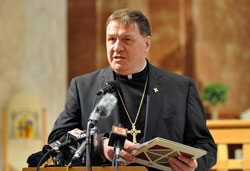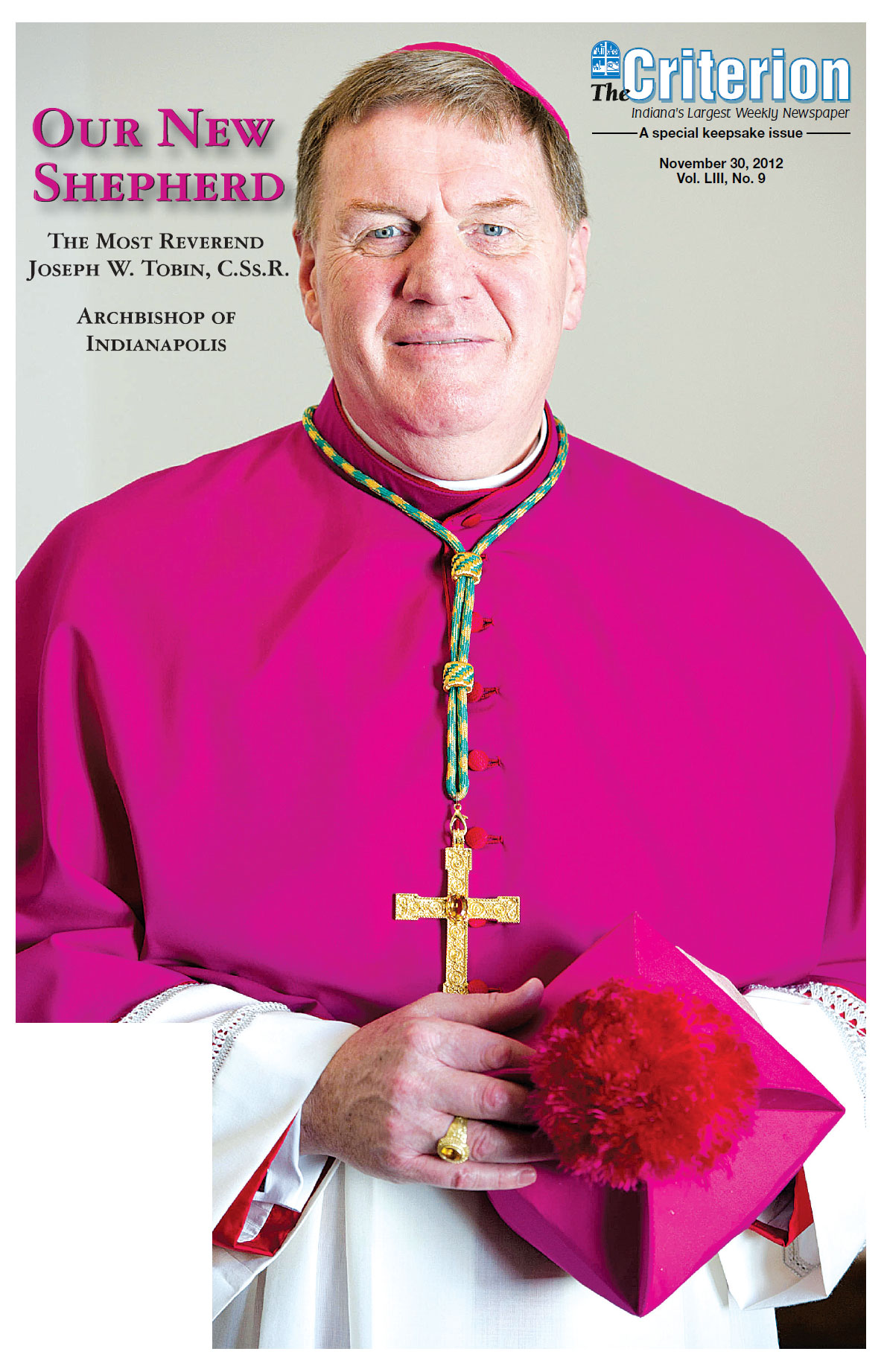W E L C O M E!
For
two days last week I was among a select few invited to participate in the
pageantry of the Installation of a beloved Redemptorist, Archbishop Joseph W.
Tobin, who is now the Archbishop of Indianapolis. This holy man is cloaked in spirituality – a
palpable spirituality that he would surely deny. He exudes a spirit of caring, sincerity, and
love, and reaches out to others. My
heart soars when Archbishop Tobin speaks of his beloved parents and siblings. His
mother and most of his twelve siblings attended both ceremonies. His mother is fragile, but she was here and
oh so proud of her oldest son. It was
touching to see him give Holy Communion to her and his other family
members.
At
the end of the two days, I felt as if I had attended a two-day spiritual
retreat. A month ago we learned that we
had a new archbishop coming to us after 12 years in Rome. Some said it was a
demotion for him, but most of us knew -
without knowing how we knew - that
we were blessed with the appointment of Archbishop Joseph Tobin. We have been
praying for over a year that the Lord would send us a good shepherd and He has.
Archbishop Tobin immediately flew to
Indianapolis for a whirlwind few days to meet his flock. During the few days that Archbishop Tobin was
in Indianapolis, he celebrated Mass for the seminarians at Marian University; a
Mass a The Little Sisters of the Poor and the elderly residing there; he was
everywhere, but quietly. At his press conference he was prayerful and humble,
humorous, and he paid homage to his predecessor, Archbishop Buechlein, who
retired due to illness. He thanked our
Apostolic Administrator Bishop Coyne for guiding us almost immediately after he
was named Auxiliary Bishop to assist Archbishop Buechlein.
And
then came the ceremonies that began on Sunday, December 2, at a Solemn Evening
Prayer for the First Sunday of Advent and Profession of Faith in anticipation
of his Installation. At first, the Sunday evening service was to be open to the
public, but then it became “by invitation only” due to the large number of
religious, family members and friends of Archbishop Tobin. I had looked forward
to attending because I knew I would never get an invitation to the Installation
Mass – or so I thought. A nun friend
invited me and my house guest to that service. The service was joyful, lots of
wonderful music along with the blessing of the Archbishop’s miter, his staff
and his pectoral cross. I walked out of the Cathedral feeling very
blessed. And why not – I had just been in the presence of greatness – our new
archbishop.
After
the Mass we were invited to the Catholic Center (across the street) for
refreshments. What a spread that was! The
company sponsoring the reception spared no expense. They apparently served
everything they would serve for their own receptions, including hot hors
oeuvres, miniature sandwiches, fruits, veggies, many desserts, and an
outstanding bar. I chuckled and thought: only Catholics!
Two
weeks before the Installation I learned that each of our 147 parishes was given
two tickets to give away. I immediately told my parish priest that I would like
an invitation to the Installation and he said he would look into it. That sounded like “no way.” It was not going to happen. I steamed and
stewed! And I wanted one or two if possible. And then came the day that my
pastor said I had a ticket! I almost shouted with joy! I then told my
house guest that she could have it. She
adamantly refused and insisted that I go. However, she is blessed with the gift
of gab, and managed to wheedle her own invitation to the Installation Mass.
The
pageantry continued on Monday, December 2 at the SS. Peter and Paul Cathedral. The Archdiocesan Choir, composed of singers
from various choirs in the archdiocese, entertained as we waited for Mass to
begin. The voices were angelic and the musical instruments from flutes to
trumpets to kettledrums demanded to be heard and appreciated, and they
were. The procession began. Altar servers were followed by the Knights
and Ladies of St. Peter Claver; the Knights and Ladies of Malta, the Knights of
Columbus, Knights and Ladies of the Holy Sepulcher, and an Irish group of women
from the Orange Order. Our hundreds of
priests and seminarians processed in along with Indiana’s bishops, the few
visiting bishops, the Papal Nuncio and finally our Archbishop Tobin. He must have been nearly blinded by the
flashes going off as he was welcomed into the Hoosier state. This saintly and
holy man opened his Installation homily with a joke about his girth, and he
saluted the largest Catholic group in Indiana – the Notre Dame football fans. He
spoke lovingly about the Church reaching out to the “marginalized the
forgotten, and those hurt by the Church.”
I have waited for years to hear such words from a bishop. I was in love!
Some
say Archbishop Tobin was removed from the Vatican because he was sympathetic
to the U.S. nuns in the cross hairs of some at the Vatican. His group was responsible for the nuns and
their supposed “disobedience.” I doubt
that this holy man would ever have approved the insults and accusations hurled
at the very nuns who taught many of us about our faith. I was not a Catholic when I attended a
Catholic school, but I never forgot it. During a very rough period in my young
life – which lasted for 9 years – it was the Catholic prayers I was taught, and
my mother’s promise that when I reached age 16, I could be baptized in the
Catholic faith, that kept me sane. Despite the nightmarish and terrifying
events thrust upon me, I knew that our Lord and His Mother were with me. They have never failed me.
How
I wish that each of my priests in prison had had a bishop such as Archbishop
Tobin. I can’t wait to tell him all about our priests in prison and what I try
to do for them and what they do for me.
I am so blessed to have them in my life. I will always feel that way
despite their protestations that they do nothing for me while I do so much for
them. It is a blessing to me to serve
these fallen angels who made mistakes in their lives. Our Lord will judge them and He will judge
me.
And
so I rejoice in he who we have awaited – Archbishop Tobin. He is humble and comes ready to serve. He has a forever home - here in Indianapolis. We welcome our Shepherd, and I wish him our Lord's peace and blessings.















